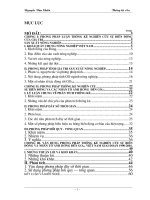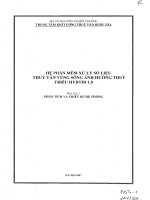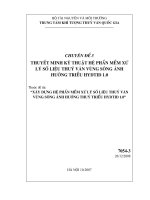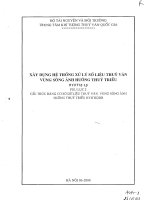ẢNH HƯỞNG CỦA MÔI TRƯỜNG LÀM VIỆC ĐẾN HIỆU QUẢ LÀM VIỆC CỦA NHÂN VIÊN
Bạn đang xem bản rút gọn của tài liệu. Xem và tải ngay bản đầy đủ của tài liệu tại đây (251.8 KB, 9 trang )
THE EFFECTS OF WORKING ENVIRONMENT ON
EMPLOYEES’ PERFORMANCE
Course Title:
The Organisation of Business
Module Tutor:
Mr. Melvin Goh
Submitted By:
Nguyen Thi Thanh Tam
Student ID:
2733448
Word count: 2182 words
Due Date: 1 July 2019
Table of Contents
1. Introduction ........................................................................................................................... 3
2. Relevance .............................................................................................................................. 3
3. Literature review ................................................................................................................... 4
3.1.
Working environment .................................................................................................... 4
3.2.
Employees’ performance ............................................................................................... 5
3.3.
Related researches .......................................................................................................... 5
4. Conclusion ............................................................................................................................. 6
References ........................................................................................................................................ 8
2|Page
1. Introduction
Human resource is a crucial part of any organization, specially in the modern era with various
challenges and difficulties. Then, it is essential that businesses proposed the appropriate strategies
to satisfy their employees to reach the best performance and come over those challenges and
difficulties. To boost the employees’ productivity and performance, organisations need to provide
good working conditions. The better working environment leads happier and harder employees,
which affect the company’s development. According to Lambert et al. (2001), working
environment is one of the main influences of employee’s satisfaction. There are numerous of
companies which are failing to realise the role of working environment for job satisfaction of
employees and facing many difficulties. Such companies with weak internal parts are limited
develop innovative products compared to their competitors (Aiken, et al., 2002). To make
employees meet the performance criteria of organisation, they also need a working environment
with good conditions for their working and performance as much as their potential can be. The
report of Armstrong and Murlis (2007) found that organisations need to aware the way working
environment influences behaviour and the way behaviour itself boosts organisation performance
in order to create better performing workplace.
This assignment aims to review the theories about the effects of working environment on job
satisfaction and employees’ performance. With the diversity and constantly changing working
environment, organisations always try not to waste the potential of their employees, as well as
improve their quality (Huges, 2007). Most companies attempt to make more comfortable, safer and
healthier workplace so as to drive the satisfactions and performance of workforce. Then the
assignment is able to be a material for employers to adjust and redesign their policies and strategies
to satisfy their employees. Moreover, the report may help society by motivating individuals to try
more in their careers as well as improve their personal development.
2. Relevance
According to Sundstrom et al (1994), about 50 percent of the employees’ time to use in their
workplace that extremely influences their mind set, attitudes, behaviour and productivity. The large
number of working environments, however, is not safe and comfortable enough for the workforce
(Perry & Porter, 1982). The bad conditions may be concern “poor air circulation, poor personal
protective equipment, inappropriate furniture, absence of fire extinguishers, unnecessary noise,
unfitting lighting and poorly designed workplaces”, as stated in the finding of Perry and Porter
3|Page
(1982). These bad values of workplace can influence negatively employee health and performance.
It is also the same view as the finding of Spector (1997) that most organisations ignore the
environmental factors at the workplace including secure of job and employees, relationship
between colleagues, recognition for their performance, job motivation, and appreciation for ideas
and contribution for the companies, which then results in a negative effect on the employee
performance. There are also other factors of working environment, according to Lane et al (2010),
consists salary, working hours, organisational structure, interaction to managers influence job
satisfaction. In the research of Arnetz (1999), the large number of employees have the issues with
their managers who do not respect them appropriately. Some problems they can face such as harsh
behaviour of supervisors, limitation of their tasks, uncomfortable feeling to contribute innovative
ideas can reduce their productivity. Killefer and Mendonca (2006) also found that the encouraging
the employees is difficulty, specially in the poor working environment.
3. Literature review
3.1.Working environment
According to Amir (2010), working environment is identified as a place arranged by the company,
in that employees interact together and achieve the goals. This place is described to suit the nature
of work or tasks need to be performed. Ajala (2012) argued that it is atmosphere surrounding of a
person which be controlled for the existence or use. The true type of working environment is able
to influence employees feeling and productivity, including “a friendly, well-designed, safe physical
space, good equipment and effective communication” (Hay Group, 2007). In the article of
Armstrong and Mulis (2007), working environment may give the ideas about the way the
workforce is valued, and standards organisations expect.
Working environment includes two components, which are physical and behavioural components
(Oswald, 2012). Physical environment contains components concerned to the things connect users
with their office environment and be divided into office layout and office comfort (Haynes, 2008).
Behavioural environment refers components concerned to the connection between users at work,
and the effect of working environment on the behaviour of the individual as well. Haynes (2008)
defined behavioural environment into two elements namely interaction and distraction.
4|Page
3.2.Employees’ performance
According to Armstrong (2007), performance is described as the what and how people achieve the
organisation’s objectives. It is the consequence of doing work at a specific time reflects how well
employees reach the qualification of a job towards the achievement of organisational goals. This
achievement of goals is predetermined or identified the standards of accuracy, completeness,
expense and the length of time Sultana et al. (2012). Individual has high performance which is
extremely important in the organisation and it is a step towards to achieve the organisational
objectives (Frese & Sonnentag, 2000).
Employee performance includes their effort, ability and perception of jobs (Sonnentag, 2002).
Armstrong (2007) found that the elements influence the level of job performance is the combination
of motivation, ability and chance to contribute. The report of Armstrong (2007) further identified
performance as a function of ability and motivation. There are many influences of employees’
motivation such as working environment, equipment, operating process, job expectation, feedback
on performance or reward policy (Stup, 2003), which also impact on their performance. To make
sure workers task done on track is a way to getting a standard performance and reach the
organisational objectives (Stup, 2003). In that environmental factors and its effects have researched
in numerous studies due to its intervention or limitation on the employees’ behaviour, hence, it also
impacts the job performance.
3.3.Related researches
There are a large number of studies about the relationship between working environment and
employee’s performance. In the research of Temessek (2009) studied the perception of employees
about the working environment in fulfilling their intrinsic, extrinsic, and other needs in
organisation, he found that with the environmental support, the satisfaction and performance of
employees would increase. Another study of Roelofsen (2002) showed that improvement of
workplace environment can decrease complains and absence of the workforce, and also increase
performance. The impact of working environment on employees’ performance, consist of physical
and behavioural components, is examined in past two decades.
The physical environment impacts on work performance, job satisfaction and employees’ health.
It is known that the design of office is a physical factor only influence the organisational
performance, however, in reality, it is also a factor of employee performance. As consequence,
managers and leaders need to focus on the physical design and environment conditions at
5|Page
workplace. According to Stallworth and Kleiner (1996), when the needs of workers are met about
the office design, they can perform more efficiently. The finding of Brill (1990) reported that it can
rise 5 to 10 percent of employees’ productivity by improving the physical design of office
environment. The survey of Hameed and Amjad (2009) in 31 banks indicated that comfortable and
ergonomic office design could motivate the workforce and increase the productivity. Another
finding of Scott et al (2000) suggested that there is the relevant of environmental conditions and
job satisfaction. Similarly, Strong et al (1999) argued that physical factors are considered as drivers
of tasks and actions affect employees’ performance. The report also inidicated that a safe and
healthy working environment plays a crucial role in worker’s productivity. Therefore, managers
should provide appropriate environmental conditions to ensure their workers can meet the required
standards (Franco, et al., 2000).
According to Anantharaman and Subha (1980), job motivation, job satisfaction, and job
performance are affected by behaviour environment of workplace. Change in behavioural
environment refers to the climate and culture of working environment (Li et al., 2013). The report
found that the results of negative change in behavioural environment are depressive symptoms,
which can be decreased by reward or benefits polices. Moreover, downsizing of an organisation
also causes depressions or stress. Amabile and Conti (1999) stated that downsizing may be a
positive method for companies which reduce the workforce and expand the competitive position
in the market. It helps organisations by decreasing costs and improve productivity and operate more
efficiently. However, it also causes diminishing of trust and communication, then create negative
influences due to the uncertainty of employees.
4. Conclusion
In conclusion, employee performance is affected by working environment. The assignment
presented both positive and negative effects of working environment job performance. Then any
organisation desires to improve productivity need to consider environmental factors of workplace
to ensure exploit the potential of their workforce as much as can be. Managing an effective
environment require attraction, creativity, comfort, and satisfaction features, as well as it can
motivate employees to work. Solutions can be suggested such as noise control, creating friendly
environment, encouraging by benefits and reward system, making favourable workplace
conditions. Chandraseker (2011) stated that policies to drive employees’ motivation including
paying wages based on performance, valuing employee contribution, recruiting agreement, and
6|Page
information sharing. When the workers satisfy, they are happier and more productivity, and it
enhances the retention in the organisation. Forming a positive working environment further can
attracts the new workforce, which completely benefits for the companies. Therefore, the
responsibility belongs to top-level position like managers and supervisors who need aware to create
an optimal working environment.
7|Page
References
Aiken, L., Clarke, S. & Sloane, D., 2002. Hospital staffing, organizational support and quality of
care: cross-national findings. International Journal for Quality in Health Care, 50(5), pp. 8794.
Ajala, E. M., 2012. The Influence of Workplace Environment on Workers’ Welfare, Performance
and Productivity. The African Symposium: An Online Journal of the African Educational
Research Network, 12(1), pp. 141-149.
Anantharaman, R. N. & Subha, V., 1980. Need satisfaction and Organizational climate. Indian
Journal of Applied Psychology, Volume 17, pp. 56-59.
Armstrong, M. & Murlis, H., 2007. Reward Management: A Handbook of Remuneration Strategy
and Practice. Kogan Page.
Arnetz, B., 1999. Staff perception of the impact of health care transformation on quality of care.
International Joural for Quality in Health Care, 11(4), pp. 345-351.
Brill, M., 1990. Workspace design and productivity. Journal of Healthcare Forum, 35(5), pp. 5153.
Chandrasekar, K., 2011. Workplace environment and its impact on organizational performance in
Public Sector Organizations, Karaikudi: Alagappa University.
Franco, L. M., Bennett, S., Kanfe, R. & Stubblebine, P., 2000. Health Worker Motivation in Jordan
and Georgia: A Synthesis of the Results. Major Applied Research, 5(3).
Frese, M. & Sonnentag, S., 2000. High performance: An action theory approach, s.l.: University
of Giessen and University of Konstanz .
Hameed, A. & Amjad, S., 2009. Impact of office design on employees’ Productivity: A case study
of Banking Organizations of Abbotttabad, Pakistan. Journal Of Public Affairs, Administration
and Management, 3(1).
Haynes, B. P., 2008. An evaluation of the impact of the office environment on productivity.
Facilities, 26(5/6), pp. 178-195.
Huges, J., 2007. Office design is pivotal to employee productivity, Sandiego.
Killefer, N. & Mendonca, L., 2006. Unproductive Uncle Sam. Business Week, p. 86.
8|Page
Lambert, E. G., Hogan, N. L. & Barton, S. M., 2001. The Impact of Job Satisfaction On Turnover
Intent: A Test of Structural Measurement Model Using a National Sample Of Workers. Social
Science Journal, Volume 38, pp. 233-251.
Oswald, A., 2012. The Effect of Working Environment on Workers Performance: The Case of
Reproductive and Child Health Care Providers in Tarime District. Unpublished, Muhimbili
University of Health and Allied Sciences..
Perry, J. L. & Porter, L. W., 1982. Factors Affecting the Context for Motivation in Public
Organizations. Academy of Management Review, 7(1).
Roeloelofsen, P., 2002. The impact of office environments on employee Performance: The Design
of the Workplace as a Strategy for Productivity Enhancement. Journal of Facilities
Management, 1(3), pp. 247-264.
Scott, K. D., Jusanne, M. & Steven, M. E., 2000. Factors influencing employee benefits beliefs
that, pay is tied to performance. Journal of Business and Psychology, Volume 14, pp. 553-562.
Sonnentag, S., 2002. Psychological Management of Individual Performance. London: John Wiley
& Son.
Spector, P., 1997. Job Satisfaction: Application, Assessment, Causes and Consequences.
California: Sage Publications.
Stallworth, J. & Kleiner, B., 1996. Recent developments in office design. Journal of Facilities,
14(1/2), pp. 34-42.
Strong, M. H., Jeannerert, P. R., McPhail, S. M. & Bleckley, B., 1999. Work context, taxonomy
and measurement of the work environment. American Psychological Association, 86(12767).
Stup, R., 2003. Control the Factors that Influence Employee Success - Managing the Hispanic
Workforce Conference. Cornell University and Penneylvania State University.
Sultana, A., Irum, S., Ahmed, k. & Mahmood, N., 2012. Impact of Training on Employee
Performance: A Study of Telecommunication Sector in Pakistan. Interdisciplinary Journal of
Contemporary Research in Business, 4(6), pp. 646-661.
Sundstrom, E. et al., 1994. Office Noise, Satisfaction, and Performance. Buffalo Organization for
Social and Technological Innovation, 26(2), pp. 195-222.
Temessek, 2009. Expanding the Psychosocial Work Environment:. Workplace Norms and Work–
Family Conflict as Correlates of Stress and Health , 3(1), pp. 71-88.
9|Page









